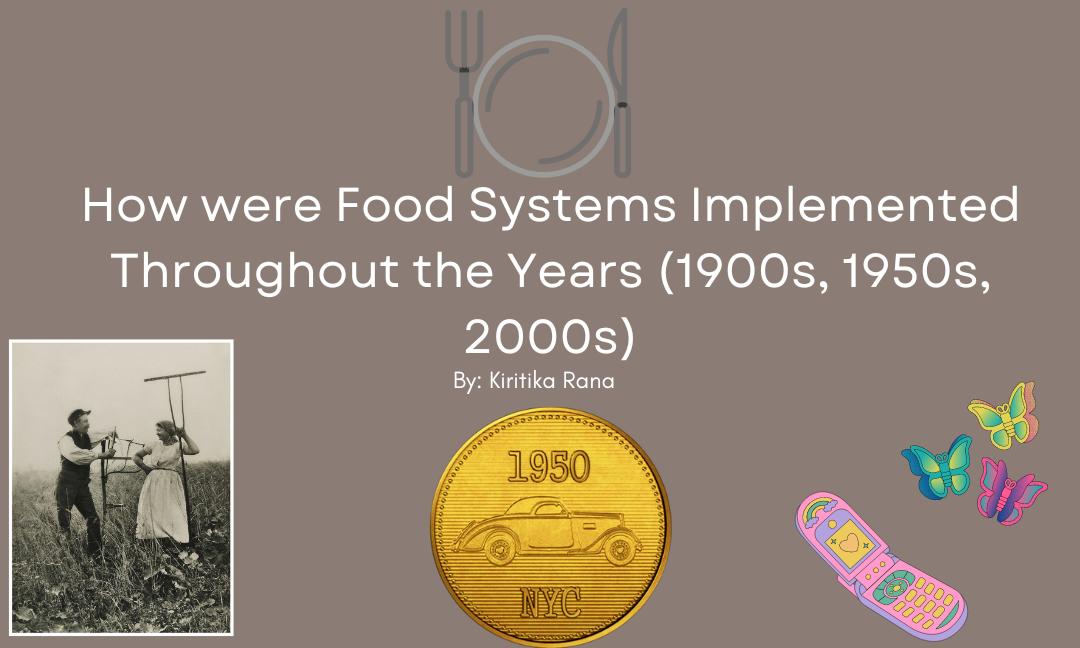Written by: Kiritika Rana
Edited by: Kiritika Rana
Designed by: Melanie Hem
Published by: Kiritika Rana
Food, an indispensable aspect of human existence, has been subject to constant change as societies evolve. The journey of food systems through the 20th and 21st centuries is a captivating tale that unveils the impact of technological progress, societal transformations, and global challenges. In this article, we explore the implementation of food systems in three distinct eras: the 1900s, the 1950s, and the 2000s. Each period mirrors the advancements, changes, and challenges that have shaped our approach to producing, distributing, and consuming food.
The 1900s: Pioneering Modernization
The turn of the 20th century saw the emergence of a new era in food systems. As societies embraced industrialization and urban life, agriculture transitioned from its traditional form to mechanized production. This shift was amplified by innovations in transportation, allowing food to be transported across vast distances with efficiency.
During this epoch, global interconnectedness in food became apparent, primarily due to advancements like canned food and refrigeration. These breakthroughs permitted the widespread distribution of perishable goods around the world. Nevertheless, this period was accompanied by its share of hurdles. Food safety and quality took center stage, prompting the establishment of regulations to safeguard consumers and prevent foodborne illnesses.
The 1950s: Convenience and Mass Production Take Center Stage
The 1950s marked a period of post-World War II prosperity and a surge in consumer culture. This decade witnessed the rise of supermarkets, fast-food chains, and the convenience of processed foods. Technological progress, including the Green  Revolution in agriculture, boosted crop yields and catalyzed the transformation of food production into a highly mechanized industry.
Revolution in agriculture, boosted crop yields and catalyzed the transformation of food production into a highly mechanized industry.
The 1950s food system underscored the pursuit of efficiency to meet the demands of an expanding population. However, concerns about the environmental repercussions of intensive farming methods and the erosion of traditional agricultural knowledge began to surface. The proliferation of highly processed foods also raised questions about nutritional value and long-term health effects.
The 2000s: Sustainability and Global Complexities
The new millennium ushered in a pivotal shift in food systems. Heightened awareness of environmental issues, climate change, and social equity refocused attention on sustainable practices and local food production. Consumers started seeking transparency in the sourcing and manufacturing of their food, leading to the growth of organic and local food movements.
Technological strides and the ubiquity of the internet revolutionized information access and commerce. Direct-to-consumer models and food delivery apps reshaped how people acquire food, providing greater customization and convenience. Simultaneously, concerns about food security, biodiversity loss, and equal access to nourishing sustenance gained prominence on a global scale.
Conclusion: A Journey Continues
The evolution of food systems over the 20th and 21st centuries is a narrative interwoven with progress, changing mindsets, and shared challenges. From the mechanization and globalization of the 1900s to the convenience-oriented 1950s and the sustainability-focused 2000s, each epoch has contributed to our food production, distribution, and consumption approach.
As we progress, the complexities of the modern world necessitate a comprehensive perspective on food systems. Striking a balance between efficient production and sustainable practices, while ensuring fairness in access and nutritional quality, remains an intricate endeavour. By gleaning insights from the achievements and setbacks of previous eras, we can aspire to shape a food system that nurtures both individuals and the planet, paving the way for a healthier and more promising future for all.
Sources
https://www.canada.ca/en/health-canada/services/canada-food-guide/about/history-food-guide.html
https://foodsystemprimer.org/production/industrialization-of-agriculture
https://sustainablefoodcenter.org/latest/blog/major-moments-in-food-agriculture-1900s-until-now
https://www.ncbi.nlm.nih.gov/books/NBK114491/

